Choosing the Best Batteries for a Golf Cart: A Comprehensive Guide
Choosing the right battery for your golf cart can make a significant difference in performance and lifespan. Investing in the right battery can transform your golfing experience by reducing downtime and increasing reliability. Whether you're a dedicated golfer or simply enjoy the ride, selecting the best battery is essential.
Types of Golf Cart Batteries
In this section, I will cover the key types of batteries found in golf carts, including their benefits and drawbacks. Understanding these differences helps you choose the right one for your specific needs.
Lead-acid (Flooded, AGM, Gel)
Flooded Lead-acid Batteries: These are the most common and affordable. They use a mixture of water and sulfuric acid to store energy. Regular maintenance, like topping off water levels, is necessary. They have a decent lifespan but can be heavy and take up a lot of space.
AGM Batteries: Absorbent Glass Mat (AGM) batteries are sealed, meaning they are maintenance-free. They have a longer life compared to flooded lead-acid batteries and are less prone to spillage. AGM batteries are also shock and vibration-resistant, making them a solid choice for rough terrain.
Gel Batteries use a gel electrolyte. They use it instead of liquid. They offer higher resistance to extreme temperatures and vibrations. Gel batteries are also maintenance-free and offer a longer lifespan. However, they can be more expensive and may not provide as much peak power as other types.
Lithium-ion
Lithium-ion Batteries: Modern lithium-ion batteries offer several advantages. They are lightweight, have a high energy density, and offer longer life spans. Because they are sealed, they require no maintenance and can work efficiently in various conditions.
These batteries also charge faster and provide consistent power delivery. They may cost more at first. But, their durability and performance can make them a wise long-term investment.
Key Selection Factors
When choosing the best battery for your golf cart, it's important to consider factors like voltage, amp-hour rating, lifespan, and cost. This ensures that the battery meets your specific needs and offers reliable performance.
Voltage and Amp-hour Rating
Voltage and amp-hour (Ah) ratings are crucial in choosing the right battery. Most golf carts run on either 36 volts or 48 volts, though some high-performance models may need higher voltages. Voltage ensures the proper electrical pressure for your golf cart’s motor.
Capacity, measured in ampere-hours, indicates how much energy the battery can store. A 100Ah lithium battery can supply 1 ampere of current for 100 hours. Choosing the right capacity depends on your usage. If you play on hilly courses or carry additional equipment, a higher capacity is beneficial.
Lifespan and Maintenance
The lifespan of a battery determines how long it will last before needing replacement. Lithium-ion batteries typically last 5-10 years. They are more durable than flooded lead-acid and AGM batteries. Maintenance is also a key factor.
Lithium-ion batteries are maintenance-free, unlike lead-acid batteries which require regular watering and cleaning. AGM batteries offer a middle ground, as they are sealed and require no maintenance. Opting for a maintenance-free battery can save you time and effort, especially if you use your golf cart frequently.
Cost-effectiveness
Cost is a major consideration. Lithium-ion batteries cost more upfront. But, their longer life and lower maintenance needs often make them cheaper in the long run. Flooded lead-acid batteries are cheaper initially but need more frequent replacement and maintenance, which can add up.
AGM batteries strike a balance between cost and maintenance. Although they cost more than flooded lead-acid batteries, they last longer and are maintenance-free. When weighing cost-effectiveness, consider the total cost of ownership, including purchase price, maintenance, and replacement costs.
Top 5 Best Golf Cart Batteries
In this section, I'll cover my top picks for the best golf cart batteries, diving into their key features and benefits. Whether you're looking for performance, durability, or value, these batteries offer a range of options to enhance your golf cart experience.
Brief Overview of Each Recommended Battery
Trojan T-105 6V Battery
The Trojan T-105 is well-respected in the golf cart battery market for its deep cycle capability and reliability. It offers 225 amp-hours, which ensures a longer runtime. The T-105 is a top-rated choice for durability and performance.
US2200 XC2 6-Volt Golf Cart Battery
The US2200 XC2 provides excellent cycle longevity and robust performance. It’s a great value option, known for its capacity and reliable power delivery, keeping your golf cart in motion for a longer period.
Universal Power Group UBGC8 8 Volt Battery
For those in need of an 8-volt option, the Universal Power Group UBGC8 stands out. This battery has 200 amp-hours and is highly regarded for its longevity and robust design. It’s perfect for low-maintenance needs.
OGRPY 12V 100Ah LiFePO4 Battery
The OGRPY 12V 100Ah LiFePO4 battery is a modern lithium option. It has high-quality lithium-iron phosphate cells. They provide stable and long-lasting performance. It’s lightweight and comes with a 5-year quality warranty.
VATRER Power 48V 105Ah Lithium Golf Cart Battery
Designed for heavy-duty use, the VATRER Power 48V 105Ah lithium battery delivers excellent power with over 4000 recharge cycles. Its built-in BMS provides enhanced safety and performance.
Key Features and Benefits
Trojan T-105 6V Battery
- Deep Cycle Capability: Ensures long-lasting performance.
- Amperage Capacity: 225 amp-hours for extended runtime.
- Durability: Trusted brand known for reliable and robust batteries.
- Charging: Quick charging time keeps you going.
US2200 XC2 6-Volt Golf Cart Battery
- Cycle Life: Known for excellent longevity.
- Value: Offers a great balance between cost and performance.
- Performance: Provides consistent power for golf carts.
- Safety: Designed to be durable and safe.
Universal Power Group UBGC8 8 Volt Battery
- Longevity: A high cycle lifespan ensures long battery life.
- Maintenance: Low maintenance compared to other batteries.
- Design: Robust construction for heavy-duty use.
- Charging: Reliable charging with smart chargers is available.
OGRPY 12V 100Ah LiFePO4 Battery
- Modern Technology: Lithium iron phosphate cells for stable performance.
- Warranty: Comes with a comprehensive 5-year warranty.
- Weight: Lightweight, enhancing the speed and efficiency of the golf cart.
- Charging Time: Efficient charging improves usability.
VATRER Power 48V 105Ah Lithium Golf Cart Battery
- Power Output: High power output of 10.24 kW.
- Longevity: Over 4000 recharge cycles for extended use.
- Safety Features: Built-in BMS for safety and better performance.
- Efficiency: Provides robust and consistent power delivery.
Performance and Cost Comparison
Let's break down the performance and costs of the best golf cart batteries. We will focus on range, power, charging time, and the trade-off between initial costs and long-term value.
A quick comparison of range, power, charging time
When it comes to range, Trojan T-105 6V Batteries excel. These batteries can provide days of use before needing a recharge, with a 225Ah capacity making them highly reliable for long golf rounds. In contrast, the Amstron GC2 6V AGM Deep Cycle Battery offers robust deep-cycle power but may not match the Trojan's longevity in heavier usage scenarios.
As for power, Lynx Lithium Iron Phosphate LiFePO4 12V Battery stands out. This lithium-ion battery is not only lighter but also provides consistent power delivery, making it a top choice for efficiency. Compared to traditional lead-acid batteries like the Trojan T-125 6V, the lithium option delivers a more constant and higher output.
Charging times vary significantly across battery types. The Enduro Power Baja Series offers a faster charge compared to most lead-acid batteries. For those in need of quicker turnaround times, the Lynx Lithium Iron Phosphate Battery also charges more swiftly due to advanced technology.
If you need a reliable adapter, the 10L0L is also a great choice, it adapts to almost all chargers and is inexpensive, with a long-term 15% off new customer purchase.
Initial cost vs. long-term value
The initial cost of batteries can be a sticking point. Lead-acid batteries, like the Trojan T-1275 12V, are generally cheaper upfront. They typically cost less than $200 each, making them a budget-friendly option.
However, lithium-ion batteries, such as the Reactive 12V 100Ah LiFePO4 Battery, come with a higher upfront price. This price can be over $500 per battery. That said, they tend to last longer, sometimes up to ten years, reducing the need for frequent replacements. This makes them a cost-effective choice over the long haul.
In addition to longevity, lithium batteries are also more efficient. They experience less energy loss during charging and discharging. This enhances their long-term value as they require less frequent charging and maintain performance better over time.
Balancing initial costs and long-term value is key. While lead-acid options can be economical upfront, investing in lithium-ion can yield long-term savings and performance benefits.
Maintenance Tips
Maintaining your golf cart battery properly can significantly extend its life and performance. Below are essential tips to help you get the most out of your battery.
Essential tips for prolonging battery life
Regular Charging: It's important to charge your battery after each use. Using a proper charger, like a 3-phase charger, ensures your battery stays in good health. Trickle charging can also help maintain the charge level during storage.
Clean Terminals: Battery terminals can get corroded over time. Cleaning the terminals with a mixture of baking soda and water can prevent corrosion. Use a wire brush to scrub off the buildup and then rinse with water.
Check Water Levels: For flooded lead-acid batteries, it's crucial to check water levels regularly. Only use distilled water to fill up the cells to avoid impurities that can damage the battery.
Inspect Connections: Ensure that all the connections between the batteries are tight and corrosion-free. If you find any loose or corroded links, tighten them up and clean them with sandpaper or a wire brush. This will help in maintaining a good flow of power.
Regular maintenance can make a huge difference in how long and well your battery performs, making your investment worthwhile.
Frequently Asked Questions
I often get asked about the best choices for golf cart batteries and how they affect performance and reliability. Here are answers to some of the most common questions.
Are lithium batteries a more efficient choice for golf carts compared to lead-acid?
Yes, lithium batteries are generally more efficient than lead-acid batteries. They offer longer life, require less maintenance, and charge faster. While they are more expensive initially, their overall cost can be lower due to their longer lifespan and fewer maintenance needs.
Can upgrading batteries have a significant impact on the speed and power of my golf cart?
Upgrading to high-quality batteries can indeed boost your golf cart’s speed and overall power. Lithium batteries, in particular, can provide better performance due to their higher energy density and efficiency. Switching from lead-acid to lithium batteries can also reduce the overall weight of the cart, further improving speed and handling.
For a 36V or 48V golf cart, what are the recommended battery specifications for optimal performance?
For a 36V golf cart, six 6V deep cycle batteries like the Trojan T-105 are commonly recommended. For a 48V golf cart, you can use six 8V or four 12V batteries.



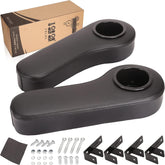
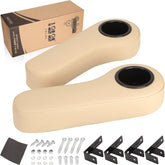
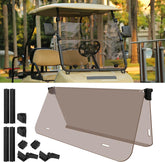
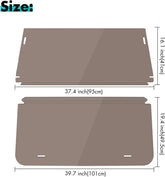

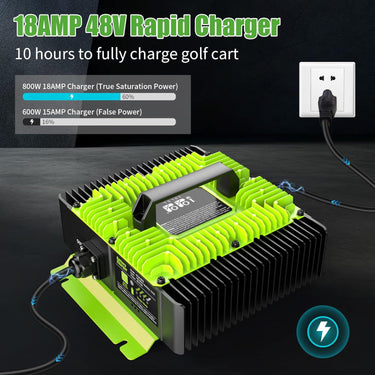
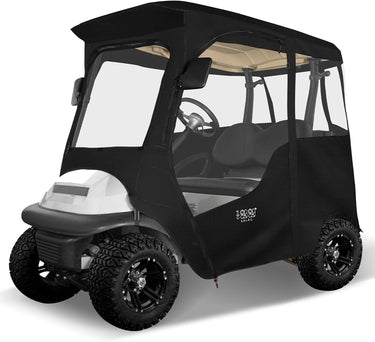
Leave a comment
Please note, comments need to be approved before they are published.